The Division of Graduate Studies is proud of its National Science Foundation Graduate Research Fellows. This prestigious research fellowship is awarded to outstanding master’s and doctoral students in science, technology, engineering, math, and STEM education disciplines. Fellows are selected on their promise to develop breakthrough research. UO NSF fellows are working on fascinating projects including bee conservation, climate change messaging, the impacts of stress on the skeletal system, and much more. Read on to learn about each NSF Fellow and their tremendous achievement and promise.
Learn more about the NSF GRF program.
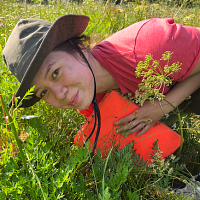
Pimsupa Jasmin Albert
Albert, a doctoral student in biology, is a plant community ecologist. She combines field studies with population models to understand shifts in species interactions driven by global change factors, including nitrogen deposition, invasive grasses, and pollinator habitat restoration.

Angelique Allen
Allen is a graduate student in the neuroscience department where she studies cephalopod visual processing. With a specific interest in how the octopus brain processes polarized light, Allen uses brain imaging techniques to see how the brain responds to visual stimuli in real time.
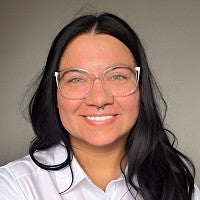
Alexandra Aringer
Aringer is a clinical and developmental psychology PhD student in the ORCHIDS Lab. She focuses on integrating different perspectives (i.e., biopsychosocial, developmental psychopathology) to better understand risk and resilience mechanisms in individuals and communities affected by trauma and adversity. She is also interested in mitigating intergenerational impacts of adversity, the biological embedding of stress, and investigating autonomic underpinnings that underscore variations in vulnerability and resilience in underserved populations.
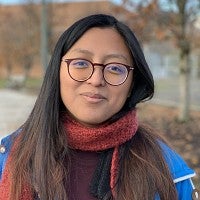
Gaby Bailey
Bailey studies carbon nanohoops which are new types of carbon nanomaterials with unique optical properties developed in the Jasti Research Group. She is systematically altering the structure of the carbon nanohoop by incorporating other elements like sulfur or nitrogen and studying the effects on the fluorescence emission of these materials. Bailey is a doctoral student in chemistry.
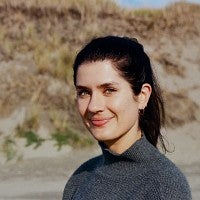
Estelle Berger
Berger is a clinical and developmental psychology PhD student in the Developmental Social Neuroscience Lab. She focuses on how features of the neighborhood environment play a role in well-being, neurodevelopment, and mental health during adolescence. Additional areas of inquiry include sleep health, how to support children and families in the context of climate change and environmental degradation, the prevention of intergenerational transmission of substance use disorder, and other topics. Berger is a doctoral student in psychology.
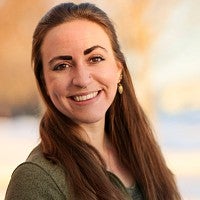
Savanah Bird
Bird is studying the causes and consequences of African elephant hybridization in the East African Albertine Rift. Using whole genome sequencing and DNA metabarcoding techniques, her goal is to better understand what hybridization means for the future of these endangered species and how the field of conservation should view hybridization more broadly. Bird is a doctoral student in biology.
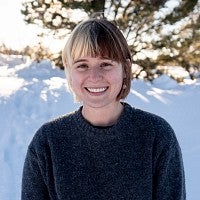
Hannah Cantrell
Cantrell is studying market integration effects on the skeleton in the Shuar, an Ecuadorian Indigenous population who participate in the Shuar Health and Life History Project, co-directed by her UO advisor, Dr. Josh Snodgrass. Using biomarkers and bone turnover markers, Cantrell is interested in how health, inequity, and lifestyle factors influence the skeleton and works at the intersection of skeletal and dental biology, human biology, and evolutionary medicine. Cantrell is a doctoral student in anthropology.
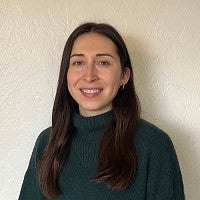
Gabrielle Coffing
Coffing is a computational biologist studying octopus evolution. She assembled a high-quality genome of the California two-spot octopus which she is using to examine the evolution of sex chromosomes in cephalopods. Coffing is a doctoral student in biology.
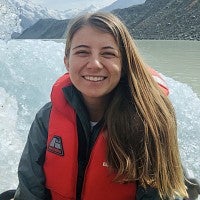
Dara Craig
Craig studies how coastal co-management affects cultural health and mauri (life force) in Aotearoa New Zealand, through the lens and practice of community engagement. As a member of the Glacier Lab and a non-Indigenous scholar, her research promotes living oceans and climate justice, with focuses on marine spatial planning, settler colonial studies, and supporting Indigenous sovereignty and self-determination. Craig is a doctoral student in environmental sciences, studies, and policy.
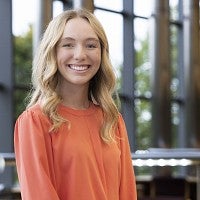
Taylor Culinski
Culinski is studying children and adolescents in kinship placements in the context of the opioid epidemic. She is interested in understanding youth perceptions of family dynamics, resiliency, and protective factors to develop programs and support services addressing the needs of youth in kinship care. Culinski is a master's student in psychology.
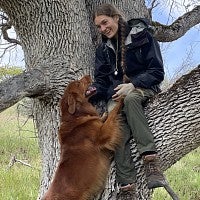
Heather Dawson
Dawson is interested in all fungi, but specializes in underground-fruiting truffle fungi with the help of her canine research partner, Rye the truffle dog. Dawson's primary research focus is on the fungi of oak savanna, and she is investigating the effects that prescribed burning has on these fungal communities. Dawson is a doctoral student in biology.
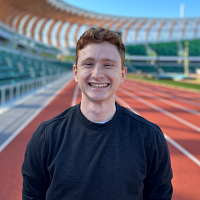
Jarod Forer
Forer is investigating how fluid microcirculation can serve as a target for new therapeutic approaches to tendon injury and disease, with an emphasis on translation to the clinical level. He is a member of the Willett Lab at the Knight Campus and the Hahn Lab in the Bowerman Sports Science Center. Forer is a doctoral student in bioengineering.
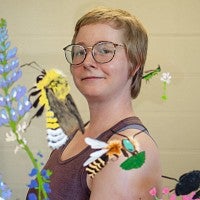
Rebecca Hayes
Hayes studies the biogeography of wild bees and their gut microbiomes. She uses machine learning and Bayesian hierarchical modeling to understand spatial patterns and drivers of variation in the pollen bees collect and the communities of organisms that live inside their guts. Hayes is a doctoral student in biology.
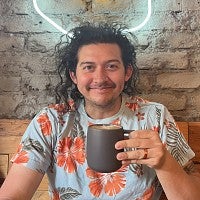
Justin Krier
Krier is working to better understand what is happening inside “Io,” one of Jupiter’s moons. He is looking at the magnetic relationship between the planet and moon. Krier is a doctoral student in earth sciences.

Mahindra Mohan Kumar
Kumar's research investigates how and why chronically underfunded mobile crisis response programs have been asked to solve systemic issues such as houselessness. His research is largely inspired by his most recent ethnographic project on case managers at a homeless services organization navigating the provision of social welfare for the unhoused during the COVID-19 pandemic. Kumar is a doctoral student in sociology.
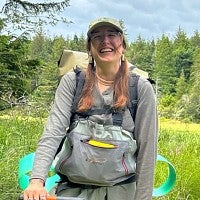
Katya Podkovyroff Lewis
Podkovyroff Lewis explores the impacts of land use and vegetation dynamics, focusing on how community compositions and ecosystems evolve over historical time scales. Her research engages with collaborative local community partnerships to translate these insights into actionable restoration and land management strategies, bridging the gap between ecological natural history research and practical applications.
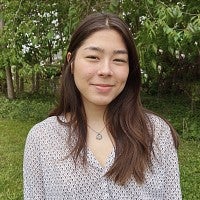
Hana Matsumoto
Matsumoto is investigating the mechanisms behind vegetative shifts in the arctic and boreal zones of Siberia and Alaska. Her work uses forest landscape simulation modeling, remote sensing and machine learning to help understand and reveal these dynamics. Matsumoto is a master's student in environmental studies.
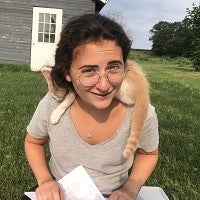
Rose McDonald
McDonald is reconstructing pollinator habitats in managed forests and, within that system, determining the underlying drivers of pathogen spread among bee communities. McDonald is a doctoral student in biology.
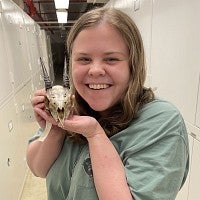
Elizabeth McGuire
McGuire is a biological anthropologist in the Stable Isotope Lab. McGuire uses stable oxygen isotopes in mammal teeth to understand water availability in African paleoecosystems. McGuire is a doctoral student in anthropology.
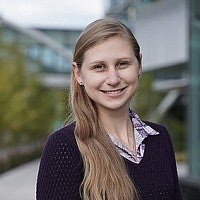
Kaylee Meyers
Meyers studies biosensors and bioelectronics which involves the development of implantable and wearable sensing platforms. Her work focuses on the engineering of sensors that fully degrade within the body after their functional lifetime is complete; such sensors could help address complications in orthopedics, sports medicine, and more. Meyers is a doctoral student in bioengineering.

Nicolette Molina
Molina explores how systemic inequities interact with personal factors to increase risk for mood disorders and suicidal thoughts and behaviors among people assigned female at birth.
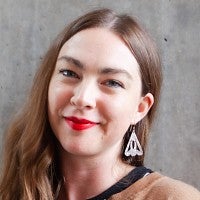
Anastasia Browning O'Hagan
O'Hagan is studying person-to-person variation in how people interpret, evaluate, and decide whether to accept or reject messaging about climate change. Her research aims to take the first step toward a more comprehensive model of message reception that can be translated into effective climate change communications. O'Hagan is a doctoral student in psychology.

Selina Davila Olivera
Olivera is a geomorphologist who studies the recurring initiation of landslides in topographic convergent zones, or hollows, and the implications that these depositional areas have for carbon cycling within watersheds. She works in the Oregon Coast Range where both landslide hazard and carbon storage are key aspects of the landscape. Olivera is a master's student in earth sciences.
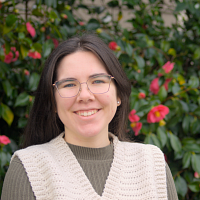
Kalika Pai
Pai is studying RNA (focusing on a long non-coding RNA related to heart disease) using single-molecule techniques. These techniques allow us to gain information about structure of the RNA, as well dynamic fluctuations that occur and interactions with other relevant biological molecules. Pai is a doctoral student in chemistry.
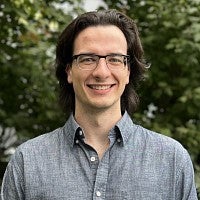
Nick Pancheri
Pancheri is a bioengineer leveraging comprehensive preclinical models of post-traumatic osteoarthritis to identify and target novel disease-modifying therapeutic mechanisms. His interdisciplinary work sits at the interface between engineering, biology, and drug delivery for translationally relevant therapeutic design. Pancheri is a doctoral student is bioengineering.
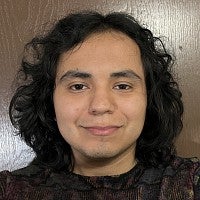
Nicolas Daniel Puentes
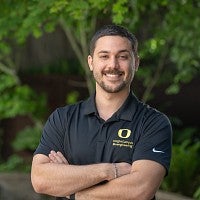
David Frey Rubio
Rubio works in Dr. Marian Hettiaratchi's Laboratory of Biomaterials for Protein Delivery and Tissue Engineering. His research aims to develop novel, affinity-based biomaterial coatings to mitigate immune reactions to neural implants. Rubio is a doctoral student in bioengineering.
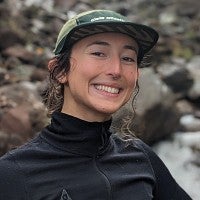
Maryn Sanders
Sanders is a geomorphologist–someone who studies the surface of the Earth and how it changes over time–and her research focus is on debris flows, which are landslides that run out long distances from where they fail. She’s working in the Columbia River Gorge and Southeast Alaska to better understand the conditions necessary to initiate these events in regions where they occur annually and pose high risk to rural and tribal communities. Sanders is a doctoral student in earth sciences.

Zach Schroeder
Schroeder is a social psychologist who uses language data to research interpersonal perception and "thought-feeling accuracy" - how good we are at knowing what’s going on inside other people’s minds. He applies this research to understanding how educators actively monitor their students’ learning and how we perceive one another during conflict on social media. Schroeder is a doctoral student in psychology.
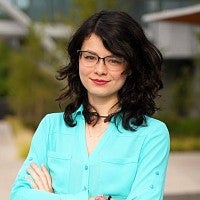
Iman von Briesen
Von Briesen's lab specializes in Melt Electrowriting (MEW), a high-resolution 3D printing technology capable of producing micron scale fibers from a variety of materials, including clinically relevant bioresorbable polymers. Her dissertation work focuses on exploring the relationships between biological systems, MEW structures, and novel scaffold materials for applications in skin tissue engineering. Von Briesen is a doctoral student in bioengineering.
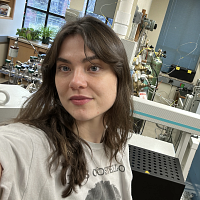
Jensen Wainwright
Wainwright is a paleoanthropologist and ecologist interested in how paleoenvironmental change over the last 6 million years in eastern Africa may have influenced human evolution. Wainwright uses stable isotope geochemistry to better understand how the diets of small mammals reflect environmental conditions in modern ecosystems, such as vegetation communities and aridity, and uses these frameworks to interpret small mammal diet and ecology in the fossil record. Wainwright is a doctoral student in anthropology.
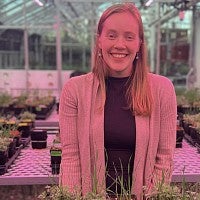
Carmen Watkins
Watkins is a plant ecologist studying species interactions in a changing world. Watkins' research explores how interactions between plants and their microbial partners change with drought and the consequences for species coexistence and biodiversity maintenance. Watkins is a doctoral student in biology.
Jaxen Godfrey
Godfrey is a doctoral student in physics.
Raleigh Goodwin
Goodwin is a doctoral student in psychology.
Phillip Hernandez
Hernandez is a doctoral student in bioengineering.
Allison LaSalvia
LaSalvia is a doctoral student in chemistry.
Andrew Lesak
Lesak is a doctoral student in physics.
Yan Carlos Pacheco
Pacheco is a doctoral student in bioengineering.
Cecelia Staggs
Staggs is a doctoral student in linguistics.
Shannan Lenke Stoll
Stoll is a doctoral student in environmental sciences, studies, and policy.
'Ana Fonongava'inga Stringer
Stringer is a doctoral student in geography.
Dehlia Wolftail
Wolftail is a doctoral student in environmental sciences, studies, and policy.
